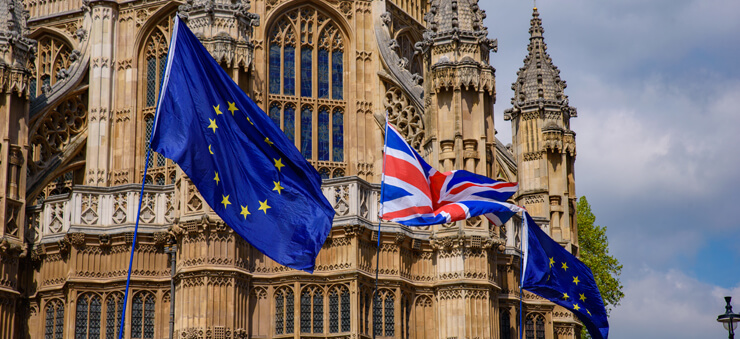GBP/EUR Slides on Back of UK Election Uncertainty

- Hopes of a soft Brexit drove up pound to six-month high
- New UK polls deflated pound’s gains
- Euro gained on back of improved German consumer confidence
The GBP/EUR pair has been experiencing mixed movements over the past two weeks, guided by UK election speculation and economic news out of the Eurozone.
On Monday, the exchange rate of the pound sterling to euro rose was based on UK election hopes, but the increase was limited. It was also temporary, as seen today, since the latest UK polls elections have already weakened the pound. The pair was further affected by a stronger euro.
Last week, the GBP/EU dropped from 1.1672 to trade at 1.1644. However, the currency pair recovered some of its losses at the start of the week. In fact, overnight, the GBP/EUR hit 1.1721, which was the highest it had traded at since May.
Tuesday morning saw the GBP/EUR slide to 1.1683 amid new uncertainty around the UK elections, as well as on the back of somewhat positive economic figures in the Eurozone.
Pound sliding over UK election worries
Hope that a somewhat soft Brexit could be in the works starting as soon as December encouraged investors to pick up the pound sterling.
The currency was further strengthened as the UK polls over the weekend showed that a Conservative majority was a possibility. Prime Minister Boris Johnson also made some remarks indicating that the Brexit deal could be in Parliament before the December holidays.
The pound’s advancement was limited, though, as the likelihood of the Conservatives winning had already boosted the price.
Furthermore, today the UK polls showed that the Labour party was advancing on the Conservatives. This resulted in new uncertainty, with a little over two weeks left until December’s general election.
Despite the polls, the Conservative party is still considered the most likely to win at the moment.
Euro gains thanks to improved German consumer confidence
Yesterday, Germany released the business confidence report. It showed that the situation was not quite as strong as expected, but it still showed signs of improvement, as did consumer confidence.
The improved consumer confidence figures were somewhat surprising after the weaker-than-expected manufacturing results.
A GfK survey of German consumers revealed that confidence will likely grow from 9.6 to 9.7 in December. According to GfK consumer expert Rolf Buerkl, the high level of confidence exhibited by consumers in Germany has helped stave off a Q3 recession.
Investors are hoping that these figures and forecasts are an indication that the situation in the Eurozone will continue to improve. This has helped boost the euro and drive down the GPB/EUR.
New UK poll data could affect GBP/EUR pair
The markets will be keeping a close eye on polling data out of the UK. After the most recent data showing that the race is getting narrower, investors will want to see if this trend continues.
If the Labour party continues to advance, it will lead to more election uncertainty. This could put further pressure on the GBP/EUR. However, if the Conservatives gain an appreciable lead, the currency pair is likely to recover somewhat.
Experts believe the pound is mainly being moved by UK politics at the moment. The level of the euro, on the other hand, will largely be affected by economic news from the Eurozone.
French growth, Eurozone inflation, and German retail figures will be released on Friday. This will likely lead to some significant movements in the GBP/EUR, depending on the results.

